This report, the EU Fundamental Rights Agency’s fourth on the topic of severe labour exploitation, is based on interviews with 237 exploited workers – both people who came to the EU, and EU nationals who moved to another EU country. They were active in diverse sectors, and their legal status also varied. But their stories all paint a bleak picture of severe exploitation and abuse.
Respondents were forced to work for endless hours with no or little pay, often in dangerous settings and without minimum safety equipment; sleep in fields or construction sites, without access to toilets or running water; and suffer humiliating sexual harassment. They endured – and rarely reported – these violations out of fear of losing wages owed to them or, for those without a right to stay, of expulsion. As a result, labour inspectorates and law enforcement authorities uncover only few of these misdeeds, and offenders face little risk of being investigated or prosecuted. Impunity looms large.
This report shows how exploitation often starts with false promises and fraud, describes the extreme conditions the exploited workers endure, and identifies the factors that facilitate exploitation. But it also outlines what can be done to help exploited workers access justice.

